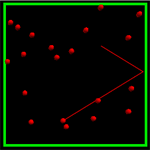

Tricia D. Shepherd
When students complete a course that I teach, my goal is that the experience has changed their perspective of both science and learning. They will not view science as a set of facts and applications, but a process grounded in experimentation, advanced through theoretical insight, and unrestricted by traditional discipline domains. They will see learning as an active process that finds reward through the persistent hard work of minimizing misconceptions, critically constructing new understanding, and synthesizing information from a variety of experiences.
General Chemistry
During the fall and spring semesters, you will usually find me teaching the 8am section of our general chemistry sequence: Principles of Chemisty I & II, respectively. Students have the unique opportunity to experience an integrated lab/lecture chemistry course. Our classroom incorporates both the safety and equipment requirements of a typical general chemistry laboratory in addition to tables arranged in the style of a classroom.
Physical Chemistry
Since I am the only Physical Chemistry professor at Westminster, I have the pleasure of teaching both Quantum Chemistry & Spectroscopy in the fall and Thermodynamics & Statistical Mechanics in the spring. For the past six-years, I have become actively involved in the revision and construction of new Physical Chemistry POGIL activities for use both at Westminster and nationwide. The Quantum Chemistry & Spectroscopy edition is now available for purchase through Wiley Custom Select.
Scientific Computing
In 2005, Helen Hu (Computer Science) and I developed a course designed to introduce general computer programming techniques to science majors. Emphasis is placed on writing numerically oriented programs for solving scientific problems and simulating physical processes from physics to chemistry to biology. We have created 24 original guided inquiry (POGIL) activities designed to lead students through the process of writing, testing, and analyzing programs while simultaneously incorporating scientific applications. Students worked in teams as they learned to program using Python.
"The value of a college education is not the learning of many facts but the training of the mind to think." Albert Einstein


